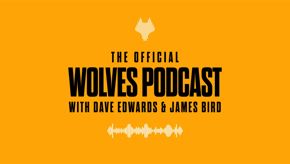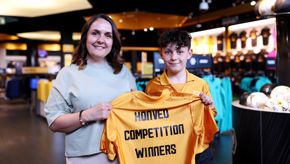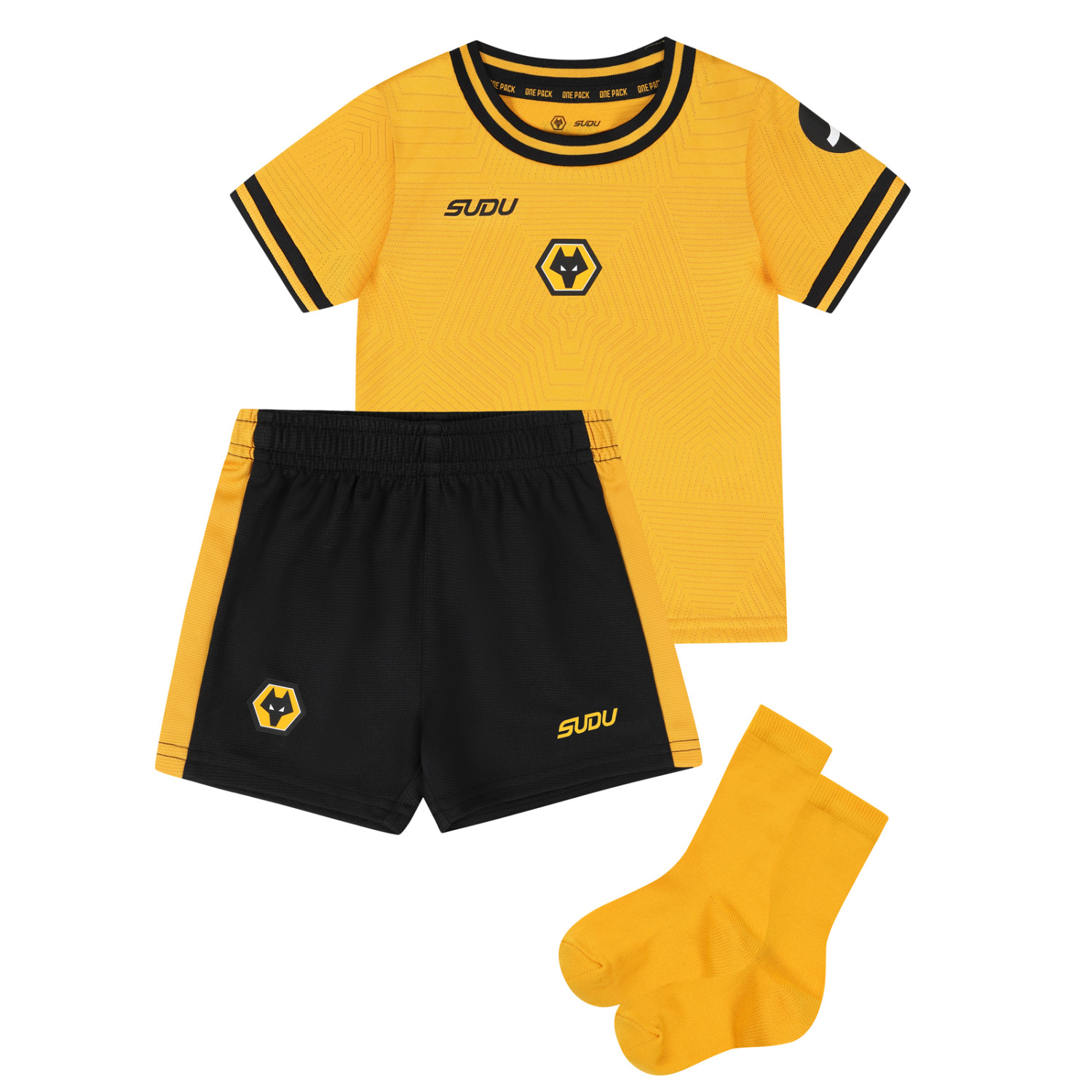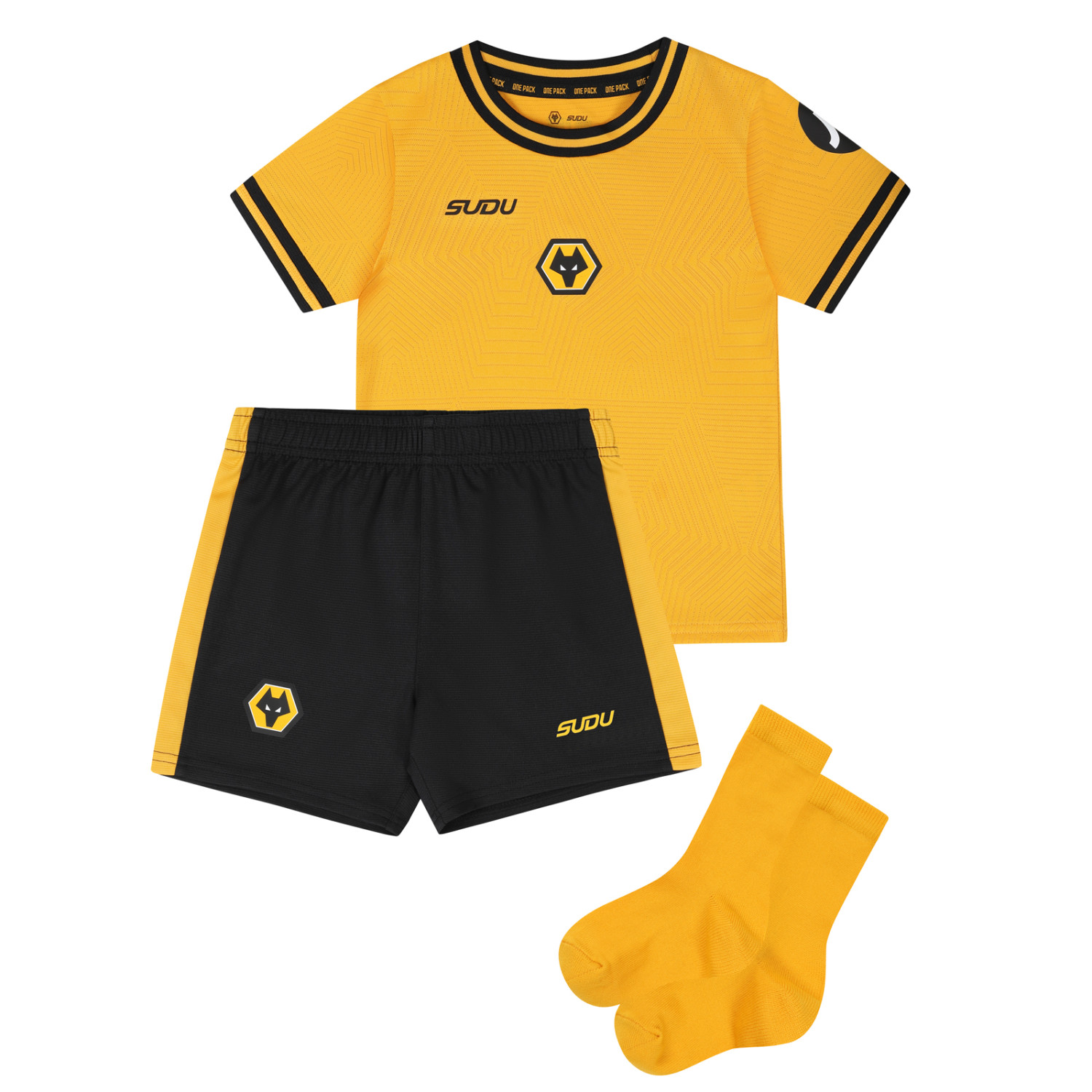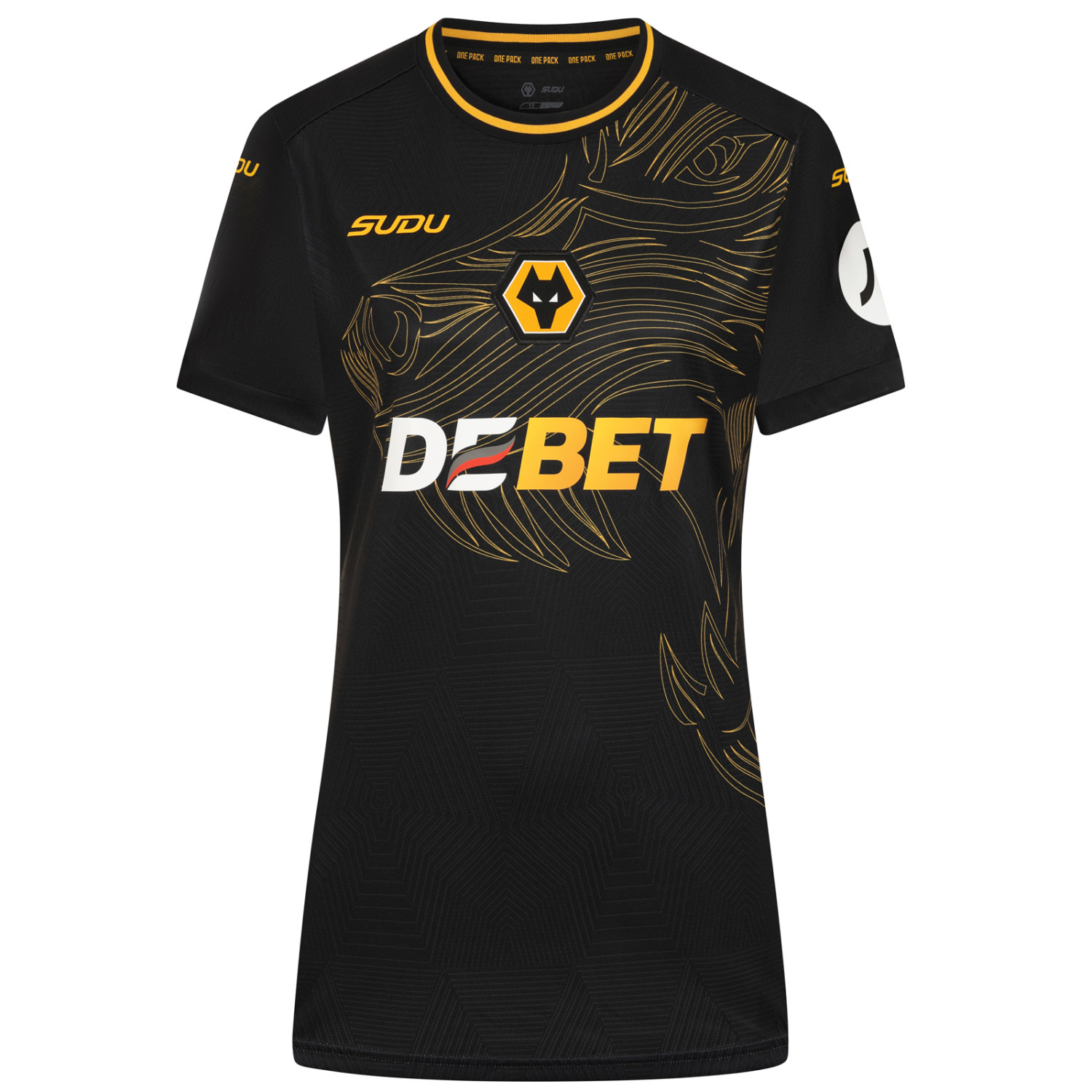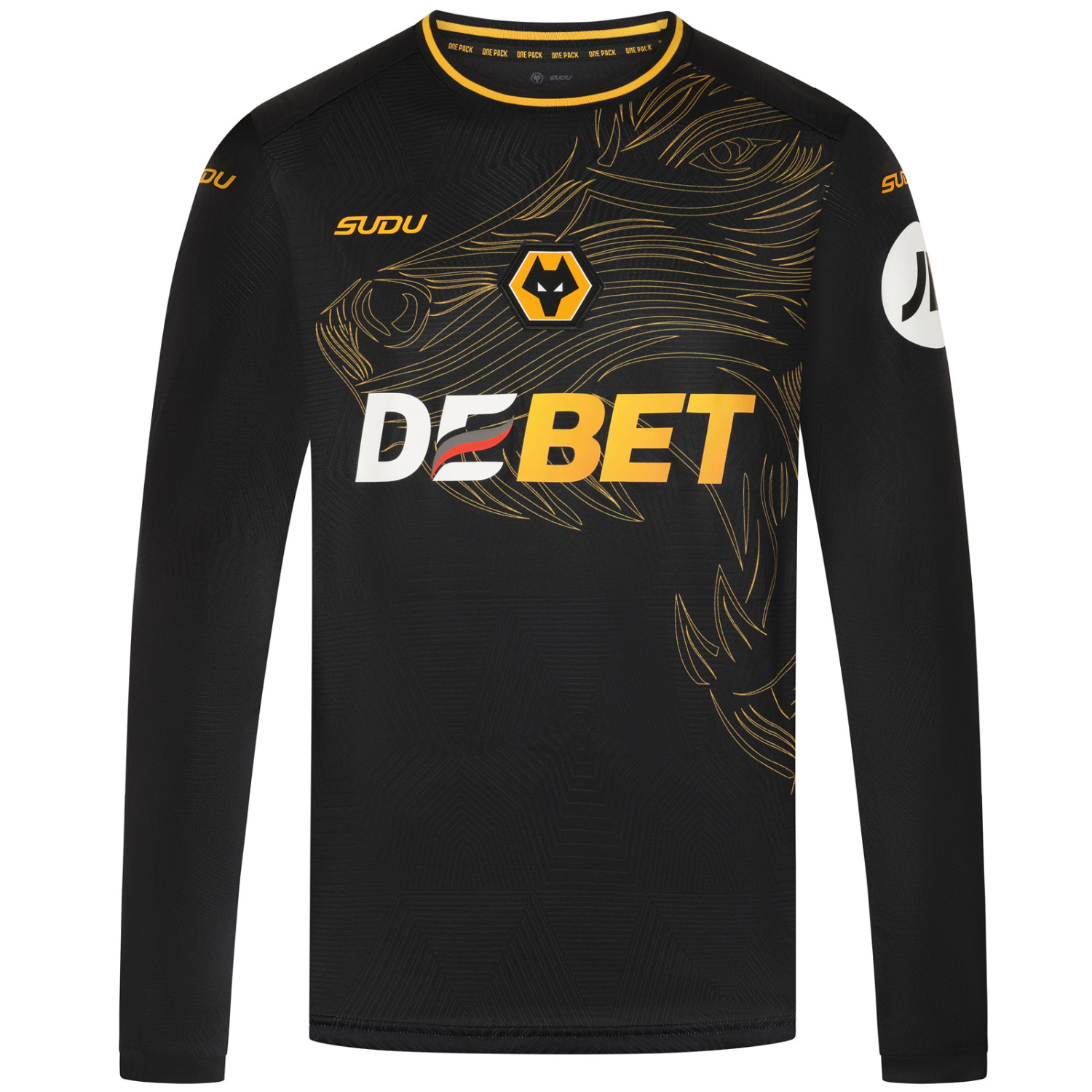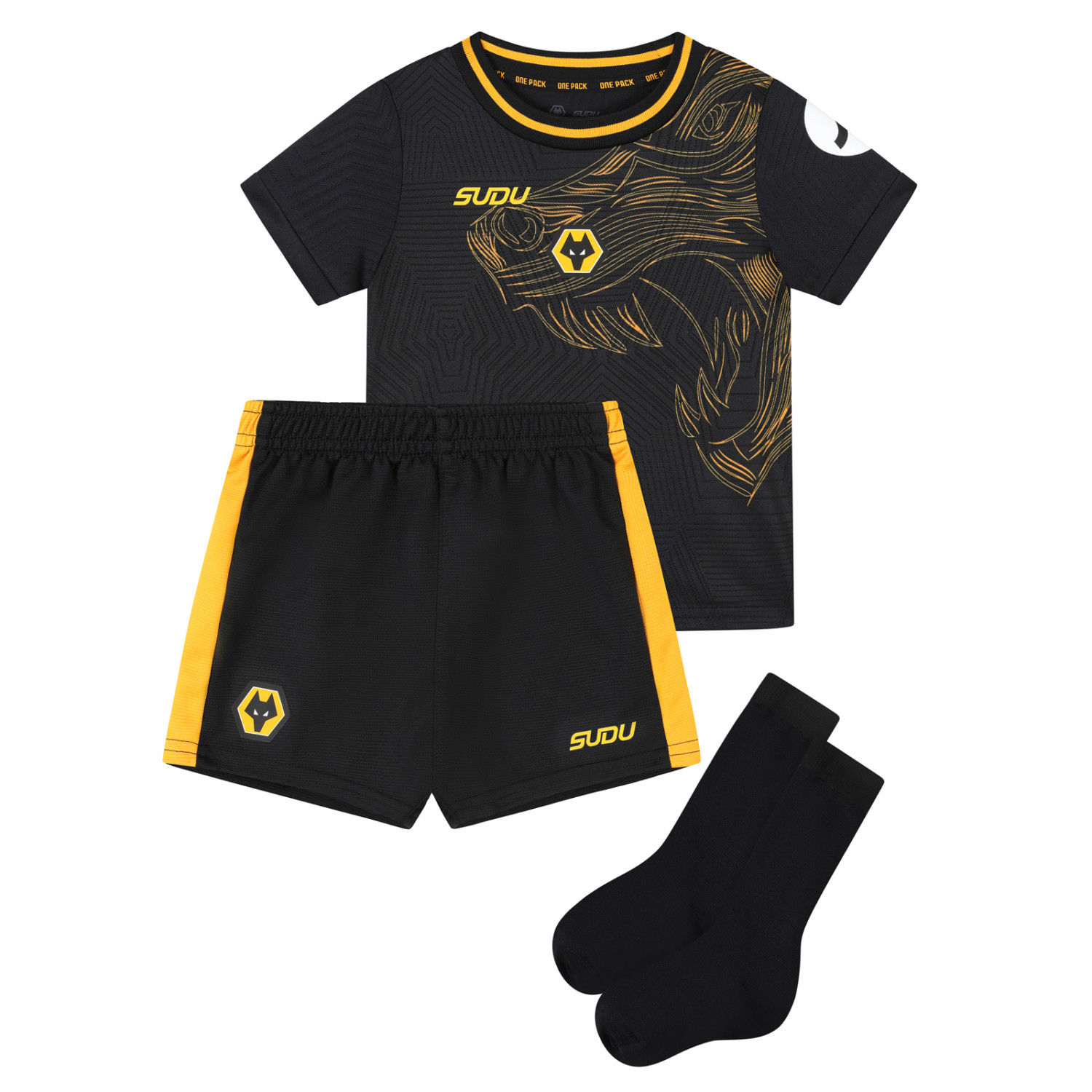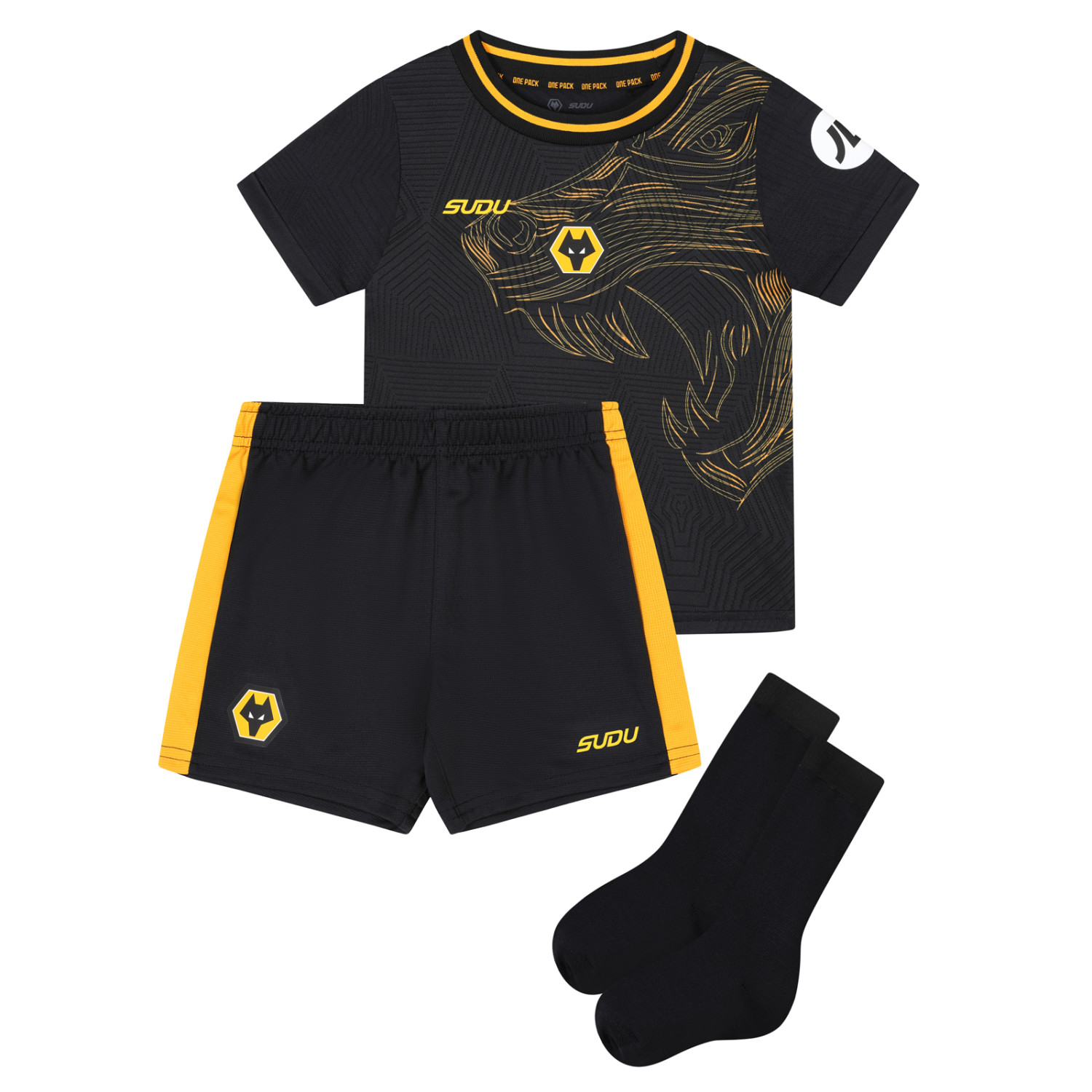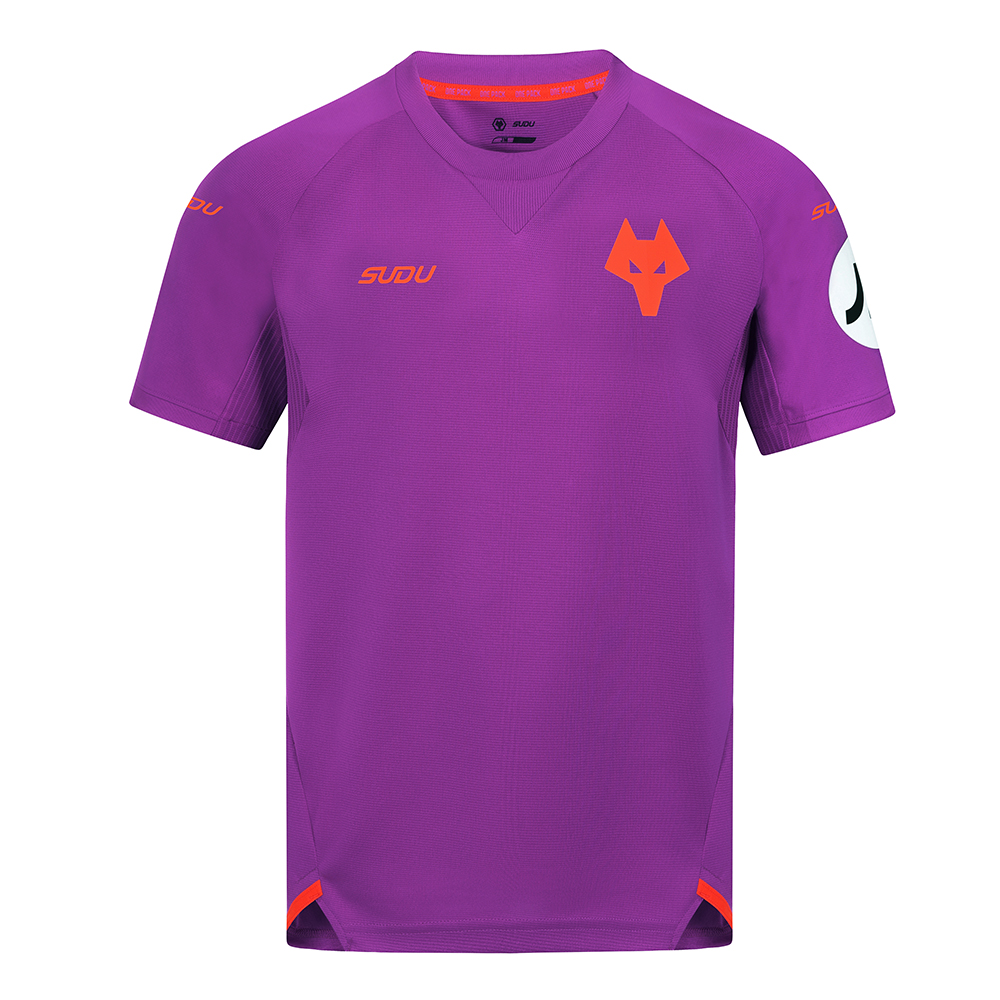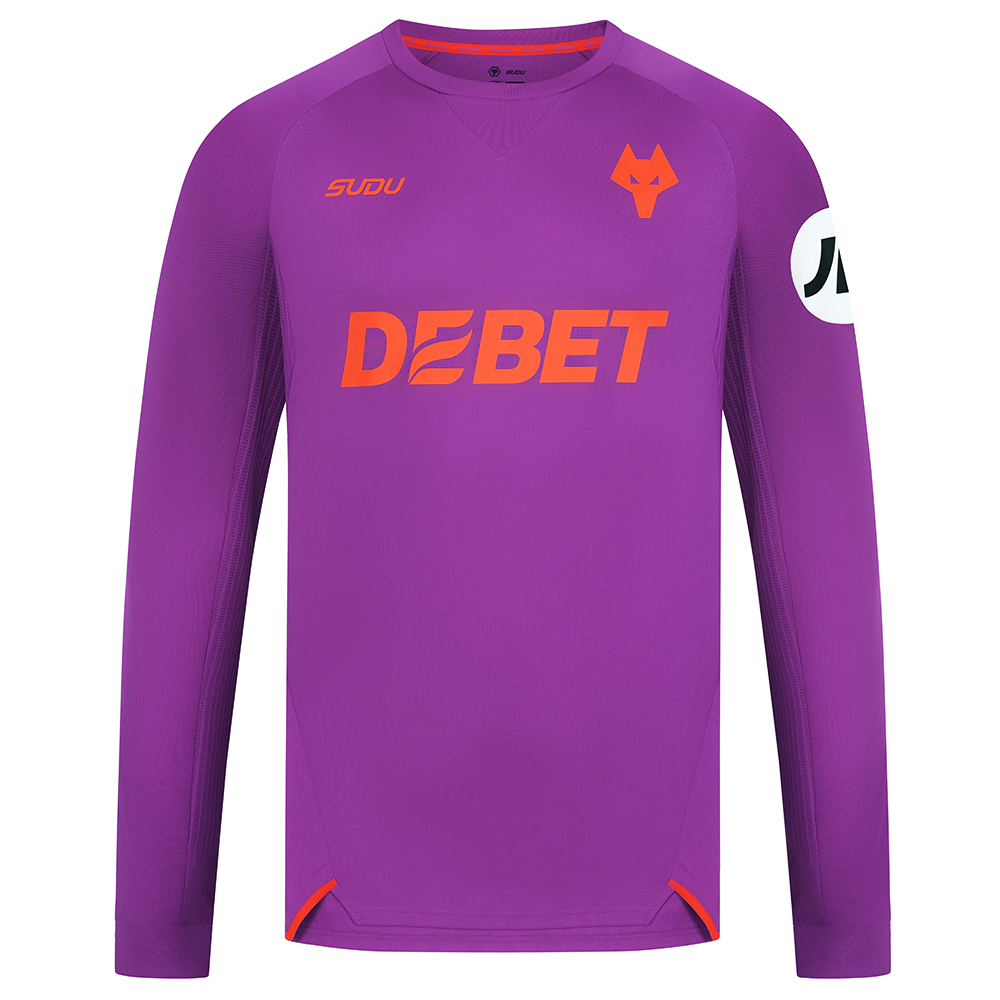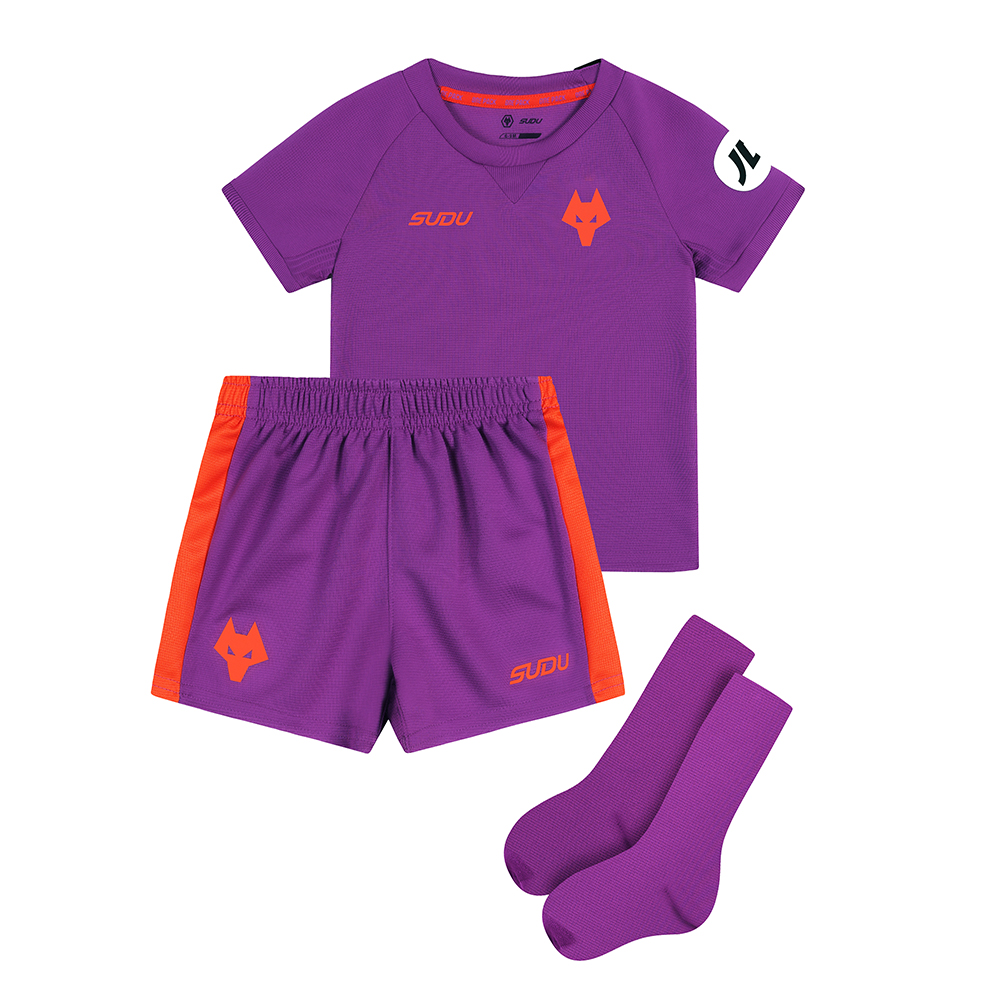WATCH
LISTEN
READ
Johnny Phillips: Hi, Bruno.
Bruno Lage: Hi.
JP: Thanks for having me here.
BL: Nice to see you.
JP: How are you?
BL: Everything is OK, thank you.
JP: Are you well?
BL: I’m OK. And you?
JP: Good, good. We’ve got a couple of days before the whole season finishes, that time when you can maybe have an assessment and look back on it. How are your feelings about it so far?
BL: We’re feeling that Wolves is our home, that’s how I feel. I think that’s the most important thing. After one year, that it was the best thing to do for my career and it is a big pleasure to be here working with these people, working with these players and working for these fans because these fans they are amazing since day one, the way they support us all season, they are amazing. So, after one year, I feel that I’m home.
JP: There are very few, only 20 of you, as head coaches in the Premier League, which is clearly one of the biggest in the world. Do you feel privileged and happy – when you say you feel at home, is that what it is, a sense of pride?
BL: Yes, a sense of pride that the big challenge came in a good moment in my career and I think we did – me and my staff – we did a good job and, as you know, everyone dreams about having the opportunity to play in the Premier League, so the dream is not just about being here, to represent this big club, but also to compete against 19 big clubs with top players and top managers. So, I think it was the best experience I can have in my professional life.
JP: The fans have got to know you, obviously, already and they’ve enjoyed what you’ve produced so far this season, but they don’t know your coaching staff too well. Are you going to introduce us?
BL: Let’s go. We have time. We are working on the next game, as you know, so the next game is against this team…
JP: Liverpool.
BL: You know this team. You know these players. You know this manager. You know what they’re doing, the last five years…
JP: Don’t give your secrets away.
BL: And we are here to prepare everything. We can start from here. So it’s Luis Nascimento. And Luis is my brother, but besides that he has a long career as a manager. He worked also in Benfica for fourteen years. He also worked with Carlos in Rio Ave and now he joined us in this adventure in Wolves. After is Alex [Silva] and you can see how we work, it’s here, and we try to control everything what happened in training. After that, him and Carlos [Cachada] do analysis of what we did in the training. Alex also has a lot of experience in the youth, he worked at Benfica, he worked at Sporting, he joined me in the B team when I arrived in Portugal, he also went to the first-team in Benfica and, after, he came with me. Here is Jhony [Conceicao]. The two analysts – Jhony and Diogo [Camacho]. So, Jhony, the first thing I say about him is he’s the most international guy we have here with us, because he started his career as a manager of Beach Soccer so he knows the world. I met him when I was in Dubai, so in 2012, and we had a big challenge when Carlos [Carvahal] invited him to be our analyst in Sheffield Wednesday and since that, when I went to Portugal, to Benfica, he came with me and he’s stayed with me since that day. Diogo works together [with Jhony]. So maybe Jhony spends more time linking with our scout department against the opponents. As you can see, we have all of the information of Liverpool, we have the faces over there, we have all the information, we try to guess the way they play and try to prepare us the best way, to prepare the best strategy for the game. And Diogo, he helps Jhony with that and also he does the analysis about our games. So, after the game, he starts to work on our game – the good things, the bad things, the things that we need to improve – so he does a little résumé for us to watch and analyse. So, after the game, he starts to do that. After, it’s Carlos, one more assistant. He has a long past also in England, in the Championship and Premier League, so he worked with [Aitor] Karanka. When I came, and I had this challenge, I invited him. I met him in Dubai in 2012, also. After that moment, he came to England to work with Karanka. Most of the things, he does the analysis of the training with Alex, and one of the things is most of the time he works in training with us and he’s responsible for the work we are doing in the defensive lines. So, every time, what happens with the defenders, how they need to move, how they need to work, it’s his role. And you know Tony [Roberts]. So Tony, I met him when I was in Swansea with Carlos [Carvalhal]. I think he fits like a glove with us. We didn’t pay too much for him to come, but he fits. Since the first day when I was there, I enjoyed working with him, so it was four, five months with him, very good, and I saw the way he worked with [Lukasz] Fabianski. I had this idea and I shared it with Jhony – maybe one day, if I have a big chance to come here to the Premier League, my first name will be Tony to work with us because he does a fantastic job with the goalkeepers. You can see what Jose [Sa] did all season, so credit for Jose but also credit for him because I never saw anyone work like him. He has his own philosophy and, as I said, it fits like a glove the way we work, and also him and Carlos are the guys responsible for the job we did all season in set pieces, the way we defend and the way we create chances to score goals, credit for them because they work hard. So we are here, seven guys, and to be honest each one has a link with the other departments of the club. I think that’s the way I like to work. I like to work with freedom and everyone knows their job, their role and, after, they link with every department. So, everyone links with the departments and all the departments of the club are important for us to be here. We have all the information and, after, it’s easier for us with what we have to do. We spend a lot of time, a lot of hours, analysing everything. After, it’s easier to prepare the training the next day, to prepare the team, to prepare the strategy to try to win the next game.
JP: We see the players out on the training ground doing their work – how much work goes on here? What hours do the coaching staff put in, aside from what goes on on the pitch?
BL: We spend a lot of time here, so it’s many hours. Because what you saw over there is like the product of our work here and you know this competition, it’s so hard and we cannot waste the time or energy of the players. So when we don’t have too many days between the games, we need to be specific – ‘Hey, guys, this is the most important thing that we need to do for the next game, these are the little things for the strategy.’ So that’s why it’s so important also the pre-season, because that’s the time when we have the players, to try to explain everything, our ideas, and it was a massive experience. If you remember, we had just two weeks with all the players and we started the season, and with games, we tried to change a little bit the way we play, that’s why I’m so happy the way we work with the players and I’m so happy the players receive our ideas because they work hard in training and they work hard in the meeting room. That’s a space that when I came, I talked about with Jeff [Shi] and Scott [Sellars] – we need to build a room and a conference space for the players to prepare the next game and also to watch ourselves, the way we are playing and to see the little things that we need to improve.
JP: Was communicating your ideas to the players one of the most important things early on? Was that the hardest bit, when you talked about having just the two weeks to work, to get what you wanted for the start of the season, was that the big challenge?
BL: Yeah, because it takes time, it’s not just like that. Even when they understand, afterwards they need training, then they need to go into games with the ideas, and after, what’s the most important thing? It’s not just for me to say, but it’s the way the players receive the message and if they believe. And with the results, they believe more. And if they believe more, the next time I say something to them, they will believe more, and we’re building like that. And you know, we talked before during the season, we came here in the first year and we didn’t want to cut with the past, we wanted to make an evolution for the work that Nuno did for the last four years.
JP: Well, let’s go outside and chat a bit more about that.
BL: Let’s go, of course.
JP: Thanks, Bruno. How much of the training session is in English and Portuguese? Do you flick between the two? Is it good to do that, to be able to do that?
BL: I prefer to talk in English of course, so that everyone understands, but if I go to a specific player and it’s easier for us to understand, I can talk in Portuguese. When I talk with the midfielders, I don’t know how, but Leander he understands very well. And every time I said, ‘Do you mind if I speak in Portuguese?’ ‘No.’ So it’s clear for him. So if I speak with the midfielders, I can talk in Portuguese because Leander understands everything. With him [points to Hwang Hee-Chan], I talk in Korean, because he understands what I’m saying. He is a good professional, he’s still here, recovering, so I’m very happy with him, very happy with him, and he offered me cookies last week so I’m more than happy with him [laughs].
JP: So, tell me, Conor Coady has he not picked up any Portuguese yet?
BL: He understands it, and you know what you learn first, all the boys know the bad words! And I’ve said this more than once, I think Coady is an impressive guy and one of the best people I know in football. He’s a massive player and captain and, every time, he’s ready and fit and he’s a good example for the younger ones. One of the good things that we can feel here, and I felt that since the first day – the environment of the players. We have good players but also good men. They have a good relationship between them and it was very easy for me to work with all of them during the season.
JP: One of the questions we were asked most often is about the style that you have brought here. What is it and do you feel that you’ve got it on to these players yet or do you feel that you’re still some way short of achieving that?
BL: I think we are in the middle. We started with the same system, try to play a little bit different, especially from the back, and one of the most important things that – and the players know that and maybe the fans understand more after one year – we don’t try just to play with the ball. The way we want to control the game with the ball is a way to protect ourselves to not spend too much time staying just in front of the box defending. Because when you look through our profile of players we don’t have tall guys to defend crosses; we can’t stay high up the pitch because then we give some spaces at the back and it’s dangerous for us, so we need to find a way to spend more time with the ball and I think part of the season we did that – some games are very hard to do that, when the opponent comes with more aggression and presses higher, we have some games that we feel we are uncomfortable in that position. But the main point is after one year of work, and when you look through the season, I think until the end of March, we were there and, unfortunately for us, January and December it was very hard because we didn’t have too many players and I remember, there was one game we just had nine players and we brought Toti to help us and we solved the problem, but in the last month, April and May, without Saiss, Max, Semedo, Ruben, Daniel, it was hard for us. And these two months made me think how important training is because these guys who were training eight months with us, they better understand our ideas. And the other point is how good the work was that these guys did because now it’s a hard moment for us, because we were nearly there and we missed our chance, but it was the same players and the same staff and the same club who put the club to fight for their goals. We felt that we were nearly there, but when you look at what we did all season, I think we are seeing a good season, the way we played some games.
JP: Absolutely and I think every fan will look at the final table and see it as higher than they may have thought it would be if they go back to August. It sounds like from what you’re saying that one of your great strengths has been the adaptability of your role and that you’ve looked at the players you’ve had and you’ve found a way of adapting the players to performing at an elite level. In terms of recruitment, what profile of player would you need to go forward, to get more of what you want?
BL: I think it’s an interesting question because that’s the point of every manager, to try to find a way to play, to show our strengths and hide our weaknesses. But we need to have the philosophy if you lose the ball in two or three passes, after, we’re defending for more time, and if you’re defending for more time, if you’re nearer the box and you’re playing against these top teams, then they can create a chance from anywhere and they can score a goal. That’s one thing. Okay, after our first transfer window it was clear what was the group of players. We worked all season with 14, 15 players, because we had important players like Neto, Boly out, so we worked with 14, 15 players during the season and we tried to find a way to do that: to show our strengths and to hide a little bit our weaknesses. I think after one year it’s clearer for me what we can do, what is the next step, and the next step is going to be very hard, because, as you know, some of the players are at the end of contracts and they may leave the club. Some of the players the club are trying to find the best agreement to renew their contracts. So if the players go, we need the same quality of players to replace them and we need, in my opinion, two or three more players because, if it happens next season what happened in these two or three months, we won’t have the players to manage the squad to stay at the same level, so that’s the target for our next window.
JP: Is it going to be a different type of player you’re looking at then or just replacing like for like? Say, for example, Ruben Neves goes, do you just get as close to Ruben Neves as you possibly can or are you looking for a different type of player? And the same maybe with the centre-halves?
BL: The reality of that is not just to replace by replace. Okay, if you sell that’s another thing, one thing is that the player doesn’t find an agreement or the player finishes his contract, but if you sell, it means we have a budget to go for more players. So if you need to sell one or two to bring in the five or six we need, we need to go for it and we need also to understand the profile of the players, if they fit what we want to take this team to the next level.
JP: So will the next level, or the next season, say, for argument’s sake, will we see Wolves playing the same as they did this season or will we see something different? Is there something you want to bring into their game?
BL: What I want is, and I think that we showed this in the games, we know that we need to have our identity and then we change a little bit. And when I came, I had the idea, okay, let’s start with this system and try to see what we can do with this system, the way we want to play, and after, game to game, the different strategies, and because we have midfielders who can do a lot of things, Ruben, Joao and also Leander, some games we play with three and we don’t change too much. So what I want is that. That’s why it’s going to be very important and I’m very excited for the next months because they’re going to be very important to define where we want to go. So the main point now is that: to build the squad that can give us solutions for everything we want. We have our identity, but after, game by game, different solutions, different problems, different dynamics and also different moments of the season. As you know, a season is long and we need a squad with balance, quality. Of course, Wolves cannot have 21 top players, but I think we can have a solid 11, 13, 14 good players with experience in the Premier League and also to have chances for kids like Toti or Yerson or Chiquinho, and kids like Luke, in the first-team, so that’s the mix of these three things that we need to build the next team.
JP: Do you think it will have greater flexibility, the next team? Do you think it will be more in a sense that you can do different things with it than you can at the moment?
BL: Every time, it’s about that, strengths and weaknesses. That’s why if we miss an important player, when we look for other players, let’s try to see what they give us. Imagine if we miss one player, okay, let’s see if the next one can be a bit taller, then there won’t be problems for us when we go for set pieces and we need to defend. Teams are very strong in set pieces, as you know. Imagine, one game if I start with Daniel, Fabio and Hwang, these three guys, Joao, Rayan and Jonny, six guys, and I don’t have tall guys in the box to defend set pieces, so this is the kind of thing. Or maybe we need to improve a little bit our defensive transitions, guys with more aggression. Okay, let’s see if we can find the little details that are important for us to upgrade the team.
JP: Yeah, I think supporters will be really fascinated to learn that, and learn those sorts of areas where you feel you need… adaptability, could be one word, but also just giving you more options in a sense, isn’t it? Are you comfortable that going into next season you will have more options than you have now?
BL: Of course. That’s why behind the scenes this job has little things it’s so hard to understand when people don’t live it. And especially here in the Premier League, the profile of the players we have, sometimes the decisions are about some situations during the game, how can we change this player for that, and, after, we have a corner and we have a big problem because we just have two or three guys over there to defend one corner, free-kick. You know that, how many games you can win with one corner or one free-kick. So we need to put everything together to make the best decisions, but I’m excited for that. It’s not going to be easy, but we will try to do our best and I think I have a good plan in my mind to come into a second season to get a good squad that gives us more consistency in the little things that we did in the first day and the fans I think it will also be exciting for them, because what’s the main point of our work? We are working for the fans, we know now in these day modern football is a little bit different, it’s more like an industry. We need to understand also the policy of the club, but in the end, what is the point? The point is the fans; we are working for the fans and, to be honest, these fans, they were there since the first day. This is a massive club. Clubs can be big in two situations: clubs who win trophies or you can see the clubs by the fans and that means a lot because everywhere I go, I can see the support of the fans. At away games, it was a big surprise for me, and we did the record – I don’t know exactly, it’s eight or nine victories away – nine, right? Nine victories away and every time we feel that we’re playing at home. When we went to hotels, we saw people from everywhere, around the world, coming from USA, from France just to watch Wolves. Even today I received letters from China, from USA, everywhere, so it means that this club is massive because of the fans and the fans were there from the first day to support us in what we did this year.
JP: Are you learning many of the songs? Have you got a favourite song from the fans yet?
BL: I know it’s good for me when they sing Raul’s song, it means that we scored a goal. And Ruben Neves – we got Ruben, so let’s see if we’ve got Ruben or not. The way I’m talking I’m feeling that emotion because football for me is emotion. Sometimes it’s so hard for me over there, being on the sideline. It was so hard for me not to watch the last two games and I didn’t experience that last moment when Coady scored the goal against Chelsea, because football is about emotion. The first thing we need to have, it’s football, attractive moments, we lose the ball we try to react, we don’t have the ball we try to press, when you have the ball pass between the players and give emotion to the fans and the fans will give emotion to us and they give us support. When everything is good, we’ve won, like we had great nights at Molineux against Everton, Newcastle, good games. Even when we don’t win and we play well, the fans were there to support us. We had great afternoons when we played away at Tottenham, Man United, the game with Everton also, and when everything is good, everything is good. But when we don’t play well, when we don’t perform well, even then the fans are there. OK, there’s one day they’re not there, but this is like a relationship. What happened? One day because the emotions are there, they think we are a disgrace, the next day, everything returns to normal and after another day, the love comes again and they come again to support us and we need to understand. That’s why it’s so important for us to understand the meaning of the club for the people of the city and we know that, that the people identify with us. I walk down the street and the people identify with us, what we’re trying to do, to put the club and the city on the map and they’re very happy with that, I feel that.
JP: Bruno, one of the successes of the season in terms of players was Max Kilman. I think the way you brought him on in the way you improved his game is something the supporters have been really happy with and they like seeing young players come through. Are there any more do you feel realistically from the Academy set-up, from the youth set-up, that you can see coming into the team soon?
BL: First, I’ll talk a little bit about Max because he did a fantastic job during the season. I think we talked about this before, there was one period that was hard for him. When we’re talking here now, people will understand a bit better what happened in that moment. It was very comfortable for Max from the first day to work with us and I see in him a good will to learn everything. He started the season very well and after five, six months with good performances comes the moment, between I think February and March, when we played Saturday, Tuesday, Saturday, Tuesday, it was hard for him, hard games to play, a lot of talk in the press about his possibility to get a call to go to the national team and a young player has everyone talking about him and we felt a little bit that the way he performed wasn’t so good. And there’s one day the people think, ‘Oh, the first moment he takes him out of the team.’ Now the people understand, but in that moment I tried to protect him, so one game out, in comes Boly, Boly had a good game. Max understood what we did with him, out of the spotlight three or four days, and afterwards, he came again and he did a fantastic performance against Everton I think. Next time it can happen with another player, they are not in a good way, out, there’s another moment when a guy can come in and play three or four games, and after, he recovers, recovers energy, maybe takes a little bit of the pressure off his shoulders, he comes back with more ambition and, after that, things come naturally. And the other thing is for Max, for sure, because I think he’s going to have a great career, that’s what I want for him, the next time the same thing happens with him, he has the experience that it’s happened before, so that’s why people say we don’t lose, we win experience. That’s the thing, next time he’ll understand the moment because he has the experience of what happened two months ago.
JP: So is it realistic from that to expect more players to make the set-up? What you’ve done with Max has been very careful, but can you realistically expect that or should supporters not think so?
BL: I hope so, I hope so. I think what Max did this season maybe started two or three years ago, with Nuno, when he played two or three games. Maybe it’s what we did with Luke this season and maybe in two or three years, we can do the same thing with Luke that we did with Max. When we talk about the staff, Carlos and Luis are the guys who work more with the manager of the under-23s team; we have a good relationship because every time we have all the kids with us to work and they were very important in the first half of the season when we just had 14 players and they were so important for us in that period, so we know all the players. When you look at the work they did, the under-18s they went to play in the cup at Man United, the work that they did in the under-23s to get to the final of the cup and now they have the next game to get promoted, so we can see they do a good job, they have good talents. Maybe Luke and maybe Chem [Campbell] are the guys who are nearer this level because they are working more with us, but they have a lot of kids, 18, 19, that with time maybe they can take the same path that Max did. And I know that, because I did it before. What was important for Max? To play with Coady and Saiss’ experience; they are there, so in the future, when Luke comes, Max will have three years with experience, so that’s the kind of things you can get with experience, but at the same time you cannot put everyone in at the same time because in the end we need to win games and for the club to fight for their goals and to continue in the Premier League.
JP: We have a few questions just related to matches themselves so it’s what fans are watching from stands and looking at. Five substitutions, are you happy with the move to five substitutions next season?
BL: During the season, I made I think 16 subs for my left- and right-back and sometimes I want to change a little bit the game in front and I don’t have that sub. You can see it in two ways, maybe the teams with different squads take advantage of that, to be honest I believe in that, when I was in Benfica I believed in that because they can change. But you can see the opposite. For us, they can give us different solutions… but when they ask my opinion, I had an opinion when I was in Benfica and it didn’t change. Modern football is going that way and to be honest when we’re playing every three days, it’s better to have more time to better manage our players. You look around the world and you cannot run away from the schedule, for the games on TV, we cannot run from that, but you need to find solutions – and I don’t know if it’s just the five subs – so as not to have a lot of injuries, not just us, especially here in the Premier League, a lot of injuries and bad injuries for players’ careers, so we need to understand that. And I know that because the first time we had the break in January and Man City, Liverpool, West Ham and Leicester did a good job in the European competition, so one thing can come from the spaces between the games.
JP: Another question related to substitutions is the timing of the substitutions you make in matches, is there a process of thought behind that? Are you naturally reluctant to make too many in-game changes or do you feel it’s important?
BL: I think it depends. If you look at what we did all season, people would say most of the time the first sub is to put Leander in the game or to change a winger. I think it’s dependent on the situation. The last game I did one thing I’ve never done, I took off one of the centre-backs because I felt that after Norwich scored, they would stay at the back, try to find the transition, and we took off one centre-back and tried to put on one more offensive player. I think every game has its own history and we go by what we’re feeling in that moment.
JP: Can you remember your first training session here, Bruno, and how much have the players changed since then, how much do you feel they’ve developed?
BL: I remember my first training session because I didn’t have players in that moment [laughs]. I think I worked with all the kids, the under-23s and Max, John Ruddy…
JP: So you were a bit short-staffed?
BL: Maybe, maybe. I don’t remember if we had any other ones. Everyone was on international duty and we wanted to give 21 days for holidays because, as you know, they have a long season. They have two long seasons because, not the other one but two years ago, they went to the quarter-finals of the Europa League, they don’t have days off. It’s very important to finish one season, recover and come with big energy for the next one. About the players, I think in general some of the players improve little things and the way we train, the way we work, we push them to play the best level they have. I think Ruben and Joao are playing the best level they have with us. I think the work we did on the defensive line, especially when we had Coady, Max and Saiss, was very good. I think Nelson [Semedo] improved a lot the defensive position; I think there was a big difference between Nelson in the first year and the Nelson in the second year. Rayan improved also. And that comes not just with the players but all of us together, because we have our way of working and that’s why my staff are so important. Our way of working is we take care about the way we play, but also we take care about the way the players can grow. So we started the season with a little chat, not me but one of my staff with them. We have our idea how we can help each player get to the next level, but we want them to say to us… for example, when we talk to Max, ‘I want to improve the way I start the game with the ball,’ so that’s one thing. ‘And defensive position, body position, aerial duels’ – so a few things individually. And it’s good for them to say what they need, or when they don’t say it, we try to guide them to say it, and after, when we come to work, they put a little bit more, not responsibility, but, ‘Okay, if you are doing this because I asked these guys for this…’ so they come with more ambition to try to improve. So that’s the little things that we can improve with the players and they were fantastic with that. Here, most of the days, I finished training very happy and very solid for the game, that we are there to try to play our game.
JP: That’s quite a personal approach, isn’t it, to training if individual needs you can meet within a session?
BL: Because the game goes to that. They need to learn and they need to understand… I used to say we’re not teaching them to play football, we’re teaching them to play as a team in the way we want to play, so the coordination of the moment. I can say an example that I saw in the last game. Coady passed to Saiss, Saiss has the ball and he can find Daniel between the lines, that’s one thing. The next game, Coady passed to Toti, and Pedro had different movements, so the dynamic is not there. It’s not about the players are better, no. The profiles of the players are different, and they don’t spend too much time working together, so if Daniel does one movement and another movement, he wants the ball at his feet or in the space. Pedro’s movement are in a different way; Toti needs to understand that, and that’s why training is so important for that, for everyone to understand how the team moves, how the team works, how the team thinks, and also to understand how you move, how you link, especially the full-back and the winger, or the three men up front or the midfielders, so these are the little things we need to work on as a team and individual things also in training. Joao is not a good example, because Joao he did everything, but a player aged 35 is different to a player aged 20, so maybe he needs to recover more or maybe he doesn’t need to work so much, intensity but not a long period, and he doesn’t need to learn everything, and maybe a younger player needs to learn everything. But Joao is not a good example because sometimes it’s hard, we need to tell him, ‘Go inside, rest, recover…’
JP: Because he always wants to be out here?
BL: Every time he wants to be here.
JP: You talked about the meeting room as one of the innovations you managed to bring in, you got the support of Scott and Jeff to get that installed – are there any other particular things you’ve done here that have been important to the way you work and have really helped the players?
BL: I think one good thing, and to be honest it was a little bit strange for the groundsman, but sometimes we use the two pitches at the same time, and it was strange at the beginning because they wanted us to train one day here, one day there, to protect the training pitch, and it took us a little bit, maybe more than a month, for them to understand that sometimes we need that.
JP: So why do you do that?
BL: One thing that we’ve improved and that we need to continue to improve, if we want to defend higher, I need to put my defensive line here, and, after, I need to protect that space over there. So if I have four or five guys here, I need balls over there. Where do I put the other guys? We need to work on the other pitch – that’s just an example. But to be honest when you have that habit of taking care of one pitch and the other pitch they take care of, when we are training here, they take care of that and, after, we change and now it comes and they just prepare one pitch, look, don’t worry, the bad things for the grass, the warm-ups, and the boxes we do out of the pitch and, after, we need both pitches to train. After that, it was amazing. The pitches every time are in good condition and also at Molineux it's very good to play, so if we play bad sometimes, it’s not about the grass [laughs]. I can complain about the boots, because these days the colours of the boots give me a lot of confusion. So if they complain about the boots, I agree with them, but the grass, no, because it’s been amazing since the first day.
JP: Well, the groundsman will be very pleased to hear that, so you’ve done them a great favour there. Obviously, next season it’s going to be hard because you’ve set a high standard for where you’ve put the team in your first season and we see the development of a club like Newcastle United with huge backing and huge funds – how can you take Wolves forward against the backdrop of other teams improving as well? It’s going to be hard.
BL: That’s the challenge and to be honest that’s going to be a big challenge for us, that’s why I’m excited because I want that kind of challenge and I want that kind of pressure. If you remember, in the middle of February, I put pressure on us to try to reach fourth place. In March, I put pressure on us to try to fight for Europa League… When you look through the table, and I agree with you that’s why it’s an important question for us to understand the moment, because we know the top six, who are going to be the top six, they can change positions, but every time they are there. West Ham, they are doing a fantastic job for the last two or three years and after comes Wolves, right, underdogs, and we come for this position. And when you look at the other teams, like Leicester, Brighton, Aston Villa, Newcastle, Everton, Leeds, massive clubs, good teams and they are in the position where they will invest and they will come with a lot of energy to try to fight for these places, what you can achieve, try to dream about, five, six, seventh position. That’s why we need to find our way to find the right player, the right person at the right price to continue to play in this way because I think it’s going to be a big, big, big challenge next season.
JP: Supporters are obviously pleased with where Wolves are at now, but some also feel they missed a chance when the door was a bit open and I guess you might see that point of view…
BL: I have that point of view.
JP: And I guess a lot of it is putting that frustration into good use next season and making sure that you can get the door open again so there is another chance to walk through it…
BL: It’s common because I put pressure on me and my players. For the last game, I said maybe I’d do better than these guys, me, as a manager, I’m saying maybe I’d do better, but I don’t forget that it was those players that put the club to fight for that position, so the balance will be that. And this is clear to everyone, if we win the last three games, okay, we finish the season that way, but I never look in that way to be honest. So when I look and I do the analysis about what we did all season, in February we were the only club behind the top six and West Ham to fight for goals and now the other teams have finished well, but the only team who could fight a little bit with them was us, so we need to think about what we did. That is what gives us more responsibility and I want that pressure, I want that pressure because it’s that pressure that moves us to the next level, so I want that pressure, I want that pressure for me to be here and try to play the same way, to try to win the next game because when I let look at the little details that’s so important to the analysis of our team, I try to understand the way we need to build a squad. And the teams in the bottom of the league, we drop… no, I will say it in a different way, we just won two points from Norwich, a hard team to play against, and we just won one point against Burnley, so three points from twelve, so nine points over there, and in away games we have a good record, so this was the best record for the club in the Premier League, and every time we play away, we feel comfortable, but in some home games, we let the opponent be comfortable at our home. I remember at the beginning of the season, they started the season very well, Brentford we lost that game and we dropped some points that I just said. But I think every team does the same analysis, we dropped points over there, we dropped points over there, and maybe we are in a different position. So the main point is that it’s very clear to us that in the next months we need to create a solid and competent squad to fight for the same goals that we fought for this season.
JP: It sounds like you’ve got the energy and the passion to take this job as far as you possibly can and do what you can with it. Is it a place that you are really comfortable working at and feel you can have proper roots here, put down roots in Wolverhampton?
BL: The place is good and it’s good we are here because you can feel my energy from here, from inside the rooms is different. The energy comes from here and if I have players with ambition to continue to grow, that’s when my energy comes. And to be honest sometimes it’s hard for me, it’s not a complaint but I need to say this, because we had that impact when I was at Benfica and we have this impact when we’re here: we come, people don’t expect too much, with the players there we solve the problem, but the problem is still there and when we go to next season, we need to solve the problems – if not, the problems will appear in front of us. That’s why it’s important to understand very clearly what we want for the next season and what type of squad we need to build.
JP: Well, Bruno, thanks for your time.
BL: You’re welcome, it was a big pleasure to receive you guys here. Thank you. You’re welcome.
All 11 instalments of Ask Wolves series two are now live in video, written and audio format and can be found by clicking on the links below:

